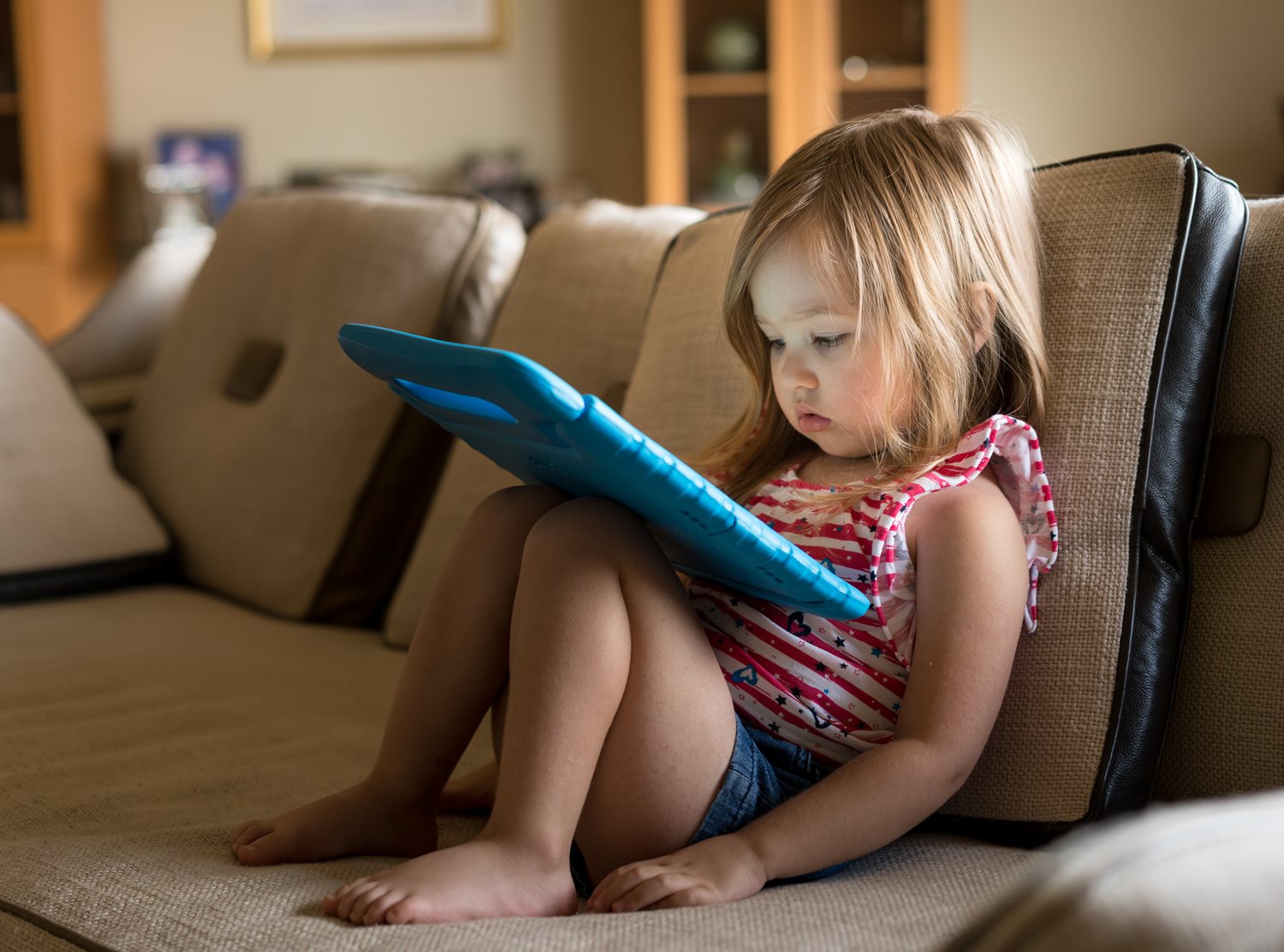Does Screen Time Affect Children’s Language Development?

Screen time has become part of our lives, including the lives of our children. Since the pandemic, children’s screen time has risen dramatically, up approximately 52% according to a recent report [1]. With children spending more and more time on screens, parents have many questions, including:
- How much screen time is okay for my child?
- Will too much screen time interfere with my child’s language development?
- Is ‘educational programming’ helpful?
Researchers have been studying children’s screen use and how it relates to their language development. Here’s what they’ve discovered so far…
Spending more time on screens does not help language development, and likely hinders it
Most studies have found that spending more time on screens has either no connection or has a negative connection with children’s language abilities. For example, a 2020 review of 42 studies found that children who spent more time on screens had lower language skills [2]. Another study of 157 toddlers found that children who spent more time on screens had lower language skills [3]. Similarly, a 2022 study found that children aged 17 - 36 months who spent more time viewing screens had smaller vocabularies. However, the study didn’t find a connection between the amount of screen time and language skills in younger children (aged 12 to 16 months) [4].
Children who start using screens earlier tend to have weaker language and cognitive skills.
Starting screen use later is better
Studies of children under the age of 2 have found a connection between the age when they start using screens and their later language and cognitive skills – children who start using screens earlier tend to have weaker skills [2, 5]. This is one of the reasons that screen time guidelines generally recommend no screen time for children until they are at least 2 years old [6, 7].
For children older than 2, what they watch on screens may (or may not) make a difference
Research has found that watching certain educational programming may have benefits for children’s language if they are older than 2 years [2, 8, 9]. Educational programs like Sesame Street and Dora the Explorer that label objects, speak directly to the child, and provide opportunities for the child to respond verbally may be helpful for their language skills [2]. However, another study that looked at children over the age of 2 found no connection between the content they watched and their language skills [4].
Children under age 2 do not benefit from educational programs
While older children may benefit from educational shows, children under 2 do not seem to benefit from these shows [10, 11]. Researchers have not found a connection between watching educational programs and language skills for younger children.
Interacting with your child while watching screens makes a difference
Studies have shown that children who interact and talk with their parents while they watch programming tend to have better language skills [2]. This fits with all of the research that shows that interacting and talking with caregivers is so helpful for children’s language development.
What about children with delayed language?
While most research has not looked specifically at children who have language delays, we can use the above information to think about the best ways to help children with delayed language development. We know that children with language delays need many opportunities to hear and use language during enjoyable interactions. The more time they spend interacting, playing, and talking with their parents and caregivers, the more opportunities they’ll have to practice communicating and learn new words. Spending a lot of time alone watching screens can mean that a child does not have enough opportunities to engage and talk back-and-forth with people. This means that they are spending less time learning about and practicing communicating.
What’s the bottom line?
Children learn language during the everyday interactions they have with the important people in their life. Nothing can replace the time you spend having fun and talking with your child. The reality is though, that screens are part of our life. However, there are ways to make the most of the time your child is spending on screens, such as:
- Pay attention to what your child is watching – For children over the age of 2, choosing educational programming tends to be better for their language development.
- Interact with your child during screen time – Watching shows with your child and talking about what they see can help your child learn new things. On the other hand, your child may not learn as much from screens if they watch alone.
- Try to follow recommended guidelines about screen time limits – The American Academy of Pediatrics and the Canadian Pediatric Society do not recommend screen time for children under the age of 2. They suggest limiting screen time for children between ages 2 to 5 to one hour per day [6, 7]
- Don’t forget about books and playtime! – Researchers are concerned that screen time may be replacing some of children’s play time, and that this can have a negative impact on language development [3, 4].
We know that play is “children’s work”, and that they learn a lot about language and interaction when they play and look at books with their parents and caregivers. Ensuring your child has time to play and look at books with you will ensure that your child is hearing lots of helpful language and is getting practice with interacting back-and-forth.
